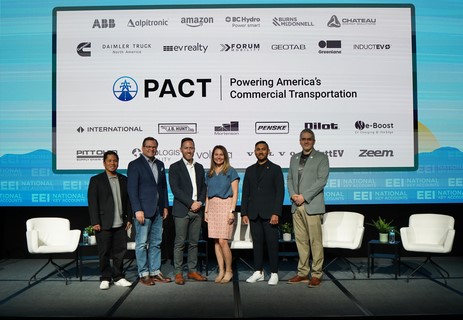Powering America’s Commercial Transportation (PACT), a coalition focused on accelerating the deployment of nationwide infrastructure for medium- and heavy-duty zero-emission vehicles (ZEVs), and the Edison Electric Institute (EEI), the association that represents U.S. investor-owned electric companies, have signed a new Memorandum of Understanding (MOU). This MOU will help advance the organizations’ goal of deploying and scaling affordable electric infrastructure necessary to facilitate and enable the widespread operation of medium- and heavy-duty vehicles (MHDVs).
PACT and EEI will prioritize cross-sector initiatives in support of the National Zero-Emission Freight Corridor Strategy and will work together to advance grid readiness across different regions to enable truck manufacturers and fleet operators to comply with federal and state ZEV regulations and goals.
The two organizations will also develop and share best practices for estimating where and when electric MHDV charging load will materialize, electric company processes to support timely energization, and state and local government policies to reduce costs and timelines associated with deploying charging infrastructure.
“PACT’s partnership with the Edison Electric Institute is an important and much-needed step toward unlocking the benefits of a commercial zero-emission vehicle future,” says Aravind Kailas, Advanced Technology Policy director at Volvo Group North America and a PACT founding member. “Close collaboration among medium- and heavy-duty vehicle manufacturers, truck fleets, charging infrastructure developers and electric companies is vital for an affordable energy transition in trucking.”
Partnerships of this sort are critical to accelerate electric commercial vehicle adoption. In addition to working with EEI, PACT has also joined organizations including the Natural Resources Defense Council (NRDC) in advancing policies to lay the foundation for the expedited and affordable build-out of the electric grid in several states.
“This is one issue on which NRDC, electric utilities, vehicle manufacturers and charging developers can agree,” says Max Baumhefner, director of EV Infrastructure, NRDC. “We’re glad they’ve joined together to build the infrastructure needed to meet our clean air goals. It’s the job at hand.”





